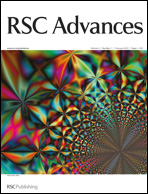A new type of unsaturated polyester resin with low dielectric constant and high thermostability: preparation and properties
Abstract
A new type of unsaturated polyester resins (UP) with low dielectric constant (κ) and high thermostability was prepared by doping N-phenylmaleimides containing perfluoroalkyl substituents (–CF3 and –C6F13) into a commercial unsaturated polyester resin. In comparison with neat UP resin, the doped UP resins showed decreased dielectric constant and increased char yields. The best result was obtained when the substituent was –CF3, which gave a dielectric constant of 3.63 and 5 wt%, loss temperature of 336 °C with a char yield of 5.57% under N2. Such data are superior to those of neat UP resin, which showed dielectric constants of 4.38 and 5 wt%, a loss temperature of 327 °C with a char yield of 2.25% . In this contribution, a new environmentally-friendly procedure for the synthesis of the


 Please wait while we load your content...
Please wait while we load your content...